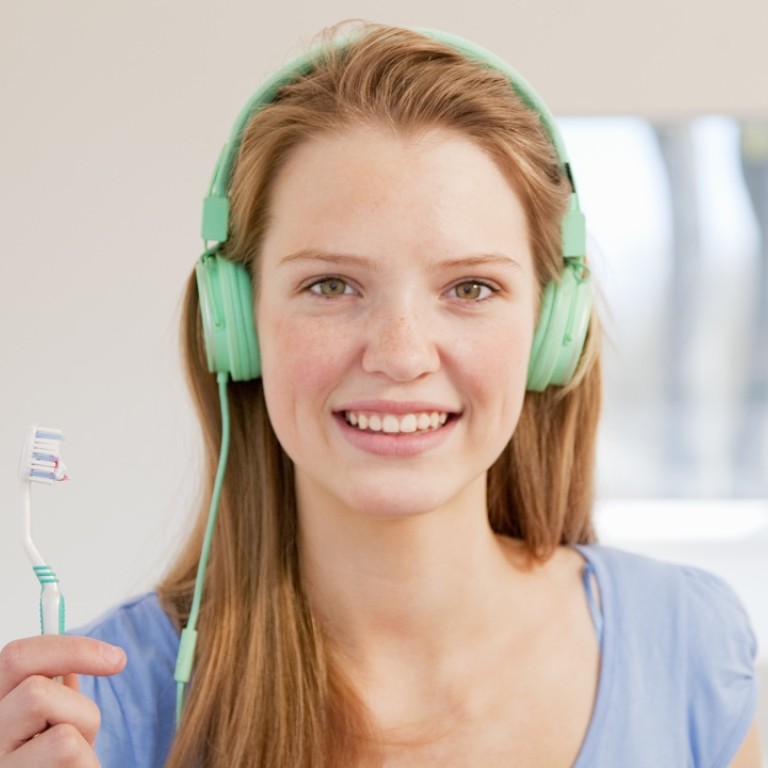
We think we’ve cleaned our teeth well when we hear toothbrush scrubbing them
Research in Japan finds aural feedback increases oral hygiene, but scientists admit piping the sound through regular headphones worn while you brush won’t work - though a speaker in the brush might
How effectively we clean our teeth and how satisfied we are with the brushing job we do depends a lot on the sound of the bristles scrubbing against the enamel, researchers in Japan have discovered. In trials with volunteer teeth cleaners, the team has used a tiny microphone in a modified toothbrush to sample the sound being made in the mouth during brushing and to modulate it and then feed that sound back to the volunteer via headphones to see what effect it would have on cleaning efficacy and satisfaction. They describe details in the International Journal of Arts and Technology.
Taku Hachisu and Hiroyuki Kajimoto of The University of Electro-Communications, in Chofu, Japan, explain how modulating the brush sound affects brushing efficacy and satisfaction. The team found that if they manipulated the pitch, or frequency and loudness, of the brushing sound they could alter the volunteers’ perception of comfort and accomplishment. They also showed that if they gradually increased the frequency as teeth cleaning progressed, the volunteers felt like the process was more comfortable and that their teeth were cleaner at the end of the process.
“Tooth brushing provides a ‘negative reward’ for users as they brush their teeth to avoid developing caries,” the team explains. Many people find the task boring. “Subsequently, users do not consider the impact of omitting the action until suffering from caries or other dental diseases,” the team adds. Their results show that it is possible to motivate users by interactively manipulating the frequency of brushing sounds, so that the task becomes more satisfying.
Importantly, the system can tell, through a built-in force sensor, whether a person is brushing too hard, which can damage the gum line, and so give them aural feedback to encourage them to clean their teeth more gently. The prototype system requires the teeth cleaner to wear headphones, which is impractical in real life. However, speakers that use bone to conduct sound could be incorporated into the smart toothbrush so that the amplified feedback loop is created in one’s mouth.
The team will next recruit volunteers to test the system in their comfort of their own bathrooms.

Using antidepressants during pregnancy greatly increases the risk of autism, according to University of Montreal scientists who reviewed data from nearly 146,000 children between the time of their conception up to age 10.
“Our study has established that taking antidepressants during the second or third trimester of pregnancy almost doubles the risk that the child will be diagnosed with autism by age seven, especially if the mother takes selective serotonin reuptake inhibitors (SSRIs),” says lead researcher Professor Anick Bérard of the University of Montreal and its affiliated CHU Sainte-Justine children’s hospital. The study is published in JAMA Pediatrics.
Family history, maternal age, depression, and certain socio-economic factors such as poverty - known to be associated with the development of autism - were taken into consideration. In the study, 1,054 children were diagnosed with autism (0.72 per cent of the children in the study), on average at 4.5 years of age.
“It is biologically plausible that antidepressants are causing autism if used at the time of brain development in the womb, as serotonin is involved in numerous pre- and postnatal developmental processes, including cell division, the migration of neuros, cell differentiation and ... the creation of links between brain cells,” Bérard explains. “Some classes of antidepressants work by inhibiting serotonin (SSRIs and some other antidepressant classes), which will have a negative impact on the ability of the brain to fully develop and adapt in utero.”
Stress in older people increases risk for pre-Alzheimer’s condition

help delay or even prevent the onset of Alzheimer’s. The findings were published online
in the journal Alzheimer Disease & Associated Disorders.
Many people with Alzheimer’s dementia first experience mild cognitive impairment – a pre-dementia condition that significantly increases the risk of developing Alzheimer’s in the following months or years. The study of 507 older adults looked at the connection between chronic stress and the most common type of mild cognitive impairment (MCI), which is primarily characterised by memory loss.
“Our study provides strong evidence that perceived stress increases the likelihood that an older person will develop [this form of] MCI,” said Dr Richard Lipton, senior author of the study.
“Fortunately, perceived stress is a modifiable risk factor for cognitive impairment, making it a potential target for treatment.”

